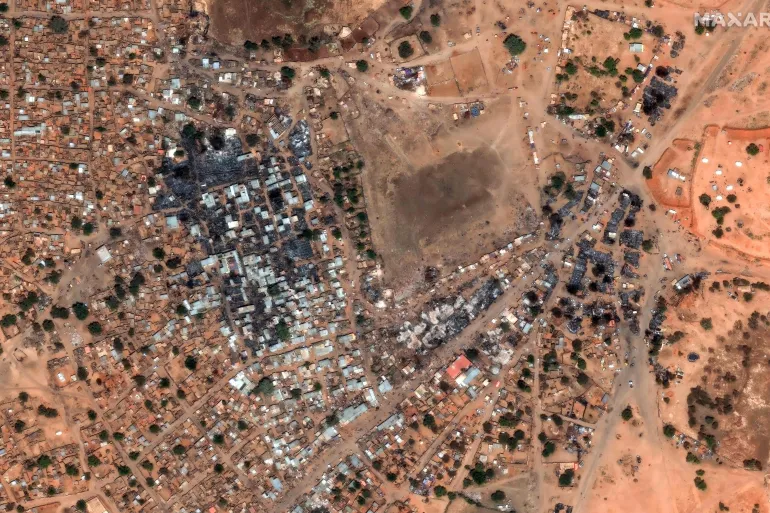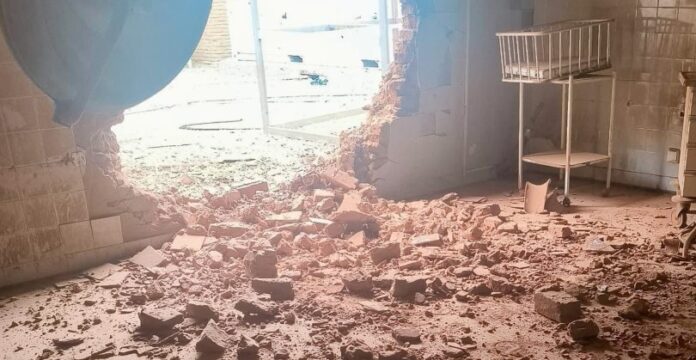Al-Yurae- Violent attacks by the Rapid Support Forces (RSF) on the city of El Fasher, the capital of North Darfur State, continue unabated, as the Sudanese government and civilian organizations denounce what they describe as a “shameful international silence” in the face of atrocities systematically committed against civilians. The city, which remains the last major army stronghold in Darfur, has become a battlefield where shells rain daily amid a suffocating siege that blocks humanitarian aid, communications, and access routes.
Over 1,300 Killed Since the Start of the Year
Local monitoring networks estimate that the number of people killed by shelling and direct attacks since the beginning of this year has exceeded 1,300. Obtaining accurate casualty figures, however, remains nearly impossible due to the blockade imposed by RSF forces led by Mohamed Hamdan Dagalo “Hemedti.” Resistance committees in the city report that between 20 and 30 people are killed every 48 hours as a result of relentless artillery strikes on residential neighborhoods and displacement centers.
The Sudanese Doctors’ Union, along with civilian groups, has repeatedly called on the United Nations, the African Union, and human rights organizations to intervene urgently to protect civilians, open safe corridors for humanitarian and medical aid, and prosecute those responsible for war crimes under international law.
Escalating Attacks and Repeated Massacres
In the latest massacre, 57 civilians—including 17 children and 22 women—were killed last Saturday in a drone strike on a displacement center. The Sudanese Doctors’ Union described the attack as “an extension of a series of massacres amounting to genocide.” The organization said the ongoing bombardment represents “a scorched-earth policy” aimed at depopulating the city through terror and starvation.

Since early October alone, El Fasher has been struck by at least three major attacks targeting hospitals and residential districts, leaving dozens dead and wounded, including medical personnel. The union condemned the bombing of El Fasher Hospital as a “complete war crime,” noting that patients and doctors were killed inside surgical and intensive care units.
In September, a drone strike hit a mosque during dawn prayers, killing 43 worshippers—among them deans and professors from the local university. The same month saw further atrocities, including the killing of 18 people in a raid on the Al-Nasrat neighborhood and 13 others in an attack on the central market. Dr. Dhu Al-Bait Ahmed, director of the Al-Salam Diabetes Center, was also killed when the medical facility was directly targeted.
Siege, Starvation, and Humanitarian Collapse
Alongside relentless bombardment, El Fasher faces an intensifying humanitarian catastrophe. Most health facilities have gone out of service, according to the Sudanese Doctors’ Union, and some hospitals have turned into mass graves following repeated strikes. Reports warn that food insecurity has reached catastrophic levels, with over 260,000 civilians—half of them children—under siege and facing severe malnutrition and disease due to food and medicine shortages.
Civilians report that RSF forces are blocking humanitarian convoys, looting aid warehouses, and sealing all access routes into the city. United Nations assessments indicate that children make up nearly half of those trapped, forced to survive on meager rations of dry grains and polluted water.
Ethnic Cleansing and Forced Displacement
Rights groups accuse the RSF of committing ethnically motivated atrocities in North Darfur. On August 24, 13 civilians—including five children and four women—were killed in the Khazan Qolo area “on an ethnic basis.” Earlier, repeated attacks targeted displacement camps in Abu Shouk and Zamzam. The Zamzam camp witnessed the deadliest massacre since the war began: over 600 displaced people were killed within ten days before the camp was converted by RSF into a military base used to surround El Fasher.
In April, 21 civilians, including women and children, were killed in the Awlad Al-Rif neighborhood, while 10 medical workers were reportedly executed, including the director of Umm Kaddada Hospital. The city’s Saudi Hospital, its largest healthcare facility, was bombed in January, killing 68 patients and companions—an atrocity described as one of the most horrific since the conflict began.
Global Inaction and Mounting Outrage
More than two years into the war between the RSF and the Sudanese Army, which erupted in April 2023, international action remains limited. Sudanese organizations accuse the United Nations and world governments of failing to fulfill their obligation to protect civilians and halt atrocities that amount to crimes against humanity. Activists note that international statements continue to “express concern” while daily bombardments and massacres proceed unchecked.
Tasnīm al-Amin, a spokesperson for the Sudanese Doctors’ Union, stated: “What is happening in El Fasher is not merely a tragedy—it is a genocide being carried out in cold blood before the eyes of the world.” She added that civilians “are dying twice—once from RSF bullets, and again from hunger and blockade,” urging immediate international intervention to stop what she described as “an ongoing war crime against the people of North Darfur.”


